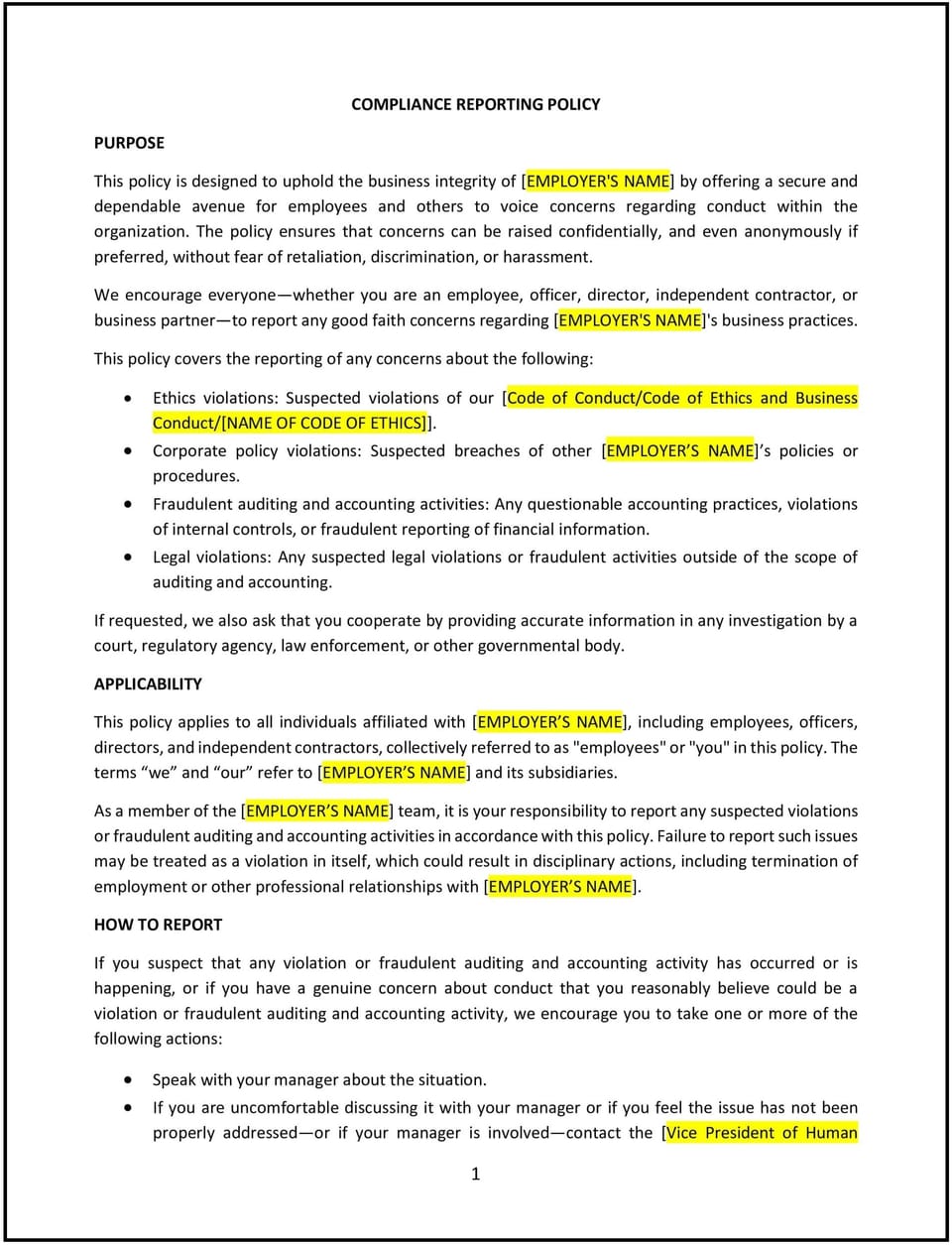Compliance reporting policy (Alaska): Free template

Compliance reporting policy (Alaska)
In Alaska, a compliance reporting policy outlines the procedures employees must follow to report violations of laws, regulations, or company policies. This policy encourages transparency and accountability while protecting employees who report concerns in good faith. By implementing a compliance reporting policy, businesses can promote ethical behavior and reduce legal and reputational risks.
Given Alaska’s diverse industries, such as oil, gas, and tourism, businesses may need to tailor the policy to address industry-specific compliance requirements and challenges, such as environmental regulations or workplace safety standards.
How to use this compliance reporting policy (Alaska)
- Define reportable issues: Clearly state the types of concerns employees should report, such as violations of laws, ethical breaches, harassment, or safety hazards.
- Provide reporting channels: Specify multiple avenues for reporting, such as direct supervisors, HR, a compliance officer, or anonymous reporting hotlines.
- Emphasize confidentiality: Assure employees that reports will be handled confidentially to the extent possible, and include protections against retaliation for reporting in good faith.
- Outline investigation procedures: Describe the steps the company will take to investigate reports, including timeframes, responsible parties, and follow-up actions.
- Promote awareness: Educate employees about the importance of compliance reporting and how it supports the company’s values and legal responsibilities.
Benefits of using a compliance reporting policy (Alaska)
A compliance reporting policy provides numerous advantages for businesses in Alaska. Here’s how it helps:
- Encourages ethical behavior: Promotes a culture of integrity by empowering employees to report misconduct without fear of retaliation.
- Supports compliance: Helps businesses address potential legal or regulatory violations promptly, reducing the risk of penalties or fines.
- Protects the company’s reputation: Demonstrates the company’s commitment to ethical practices and compliance, building trust with stakeholders.
- Reduces risks: Identifies and addresses issues early, minimizing the potential for harm to employees, customers, or the environment.
- Enhances employee confidence: Assures employees that their concerns will be taken seriously and handled appropriately.
Tips for using a compliance reporting policy (Alaska)
- Be transparent: Clearly communicate how reports will be handled, including the confidentiality process and protections against retaliation.
- Tailor to your industry: Address specific compliance requirements relevant to Alaska’s key industries, such as environmental regulations or workplace safety in oil and gas operations.
- Include anonymous options: Provide employees with the option to report concerns anonymously to encourage reporting without fear of exposure.
- Regularly review the policy: Update the policy to reflect changes in laws, company practices, or industry standards to ensure ongoing relevance and effectiveness.
- Train employees: Conduct regular training to ensure employees understand their reporting obligations and the steps involved in the process.
Q: What types of issues should employees report under this policy?
A: Employees should report any violations of laws, regulations, company policies, or ethical standards, such as safety hazards, harassment, or fraud.
Q: How can employees report compliance concerns?
A: Employees can report concerns through designated channels such as their supervisor, HR, a compliance officer, or an anonymous hotline.
Q: What protections are in place for employees who report concerns?
A: Employees who report concerns in good faith are protected against retaliation, and their reports will be handled confidentially to the extent possible.
Q: How should the company investigate compliance reports?
A: The company should follow a clear procedure that includes assigning investigators, setting timeframes, and ensuring follow-up actions are documented and communicated appropriately.
Q: How often should this policy be reviewed?
A: The policy should be reviewed annually or after significant changes in regulations or company operations to ensure it remains effective and up to date.
This article contains general legal information and does not contain legal advice. Cobrief is not a law firm or a substitute for an attorney or law firm. The law is complex and changes often. For legal advice, please ask a lawyer.


